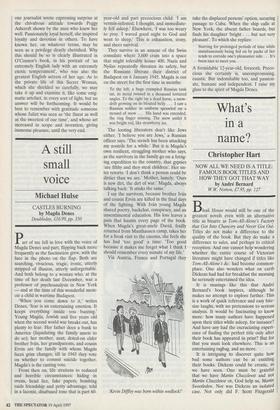A still small voice
Michael Hulse
CASTLES BURNING by Magda Denes Doubleday, £16.99, pp. 350 Part of me fell in love with the voice of Magda Denes and part, flipping back more frequently as the fascination grew, with the face in the photo on the flap. Both are searching, vivacious, tragic, ironic, utterly stripped of illusion, utterly unforgettable. And both belong to a woman who, at the time of her death last December, was a professor of psychoanalysis in New York — and at the time of this wonderful mem- oir a child in wartime Budapest.
`When you come down to it,' writes Denes, 'fear is an entertaining emotion. It keeps everything inside you buzzing.' Young Magda, Jewish and five years old when the second world war breaks out, has plenty to fear. Her father does a bunk to America (liquidating the family assets to do so); her mother, aunt, doted-on elder brother Ivan, her grandparents, and cousin Ervin are the family with whom Magda faces grim changes, till in 1943 they vote on whether to commit suicide together. Magda's is the casting vote.
From then on, life straitens to reduced and horrible circumstances: hiding in ovens, head lice, fake papers, bombing raids friendship and petty advantage, told in a laconic, disabused tone that is part 60- year-old and part precocious child: 'I am vermin-infested, I thought, and immediate- ly fell asleep.' Elsewhere, 'I was too weary to pray. I waved good night to God and went to sleep.' This is exhaustion, irony, and sheer survival.
They survive in an annexe of the Swiss consulate where 3,600 cram into a space that might tolerably house 400. Nazis and Nyilas repeatedly threaten its safety, but the Russians liberate their district of Budapest on 6 January 1945. Magda is out on the street for the first time in months:
To the left, a huge crumpled Russian tank sat, its metal twisted in a thousand tortured angles. To the right lay a dead horse, a snow- drift growing on its bloated belly . . . I saw a Russian soldier in uniform sprawled on a mound of snow . . . His hand was extended, the ring finger missing. The snow under it was bright red, like strawberry ice.
The looting liberators don't like Jews either. 'I believe you are Jews,' a Russian officer says. 'The stench has been attacking my nostrils for a while.' But it is Magda's own resilient, struggling mother who says, as the survivors in the family go on a forag- ing expedition to the country, that gypsies `are filthy and they steal children'. Her sis- ter retorts: 'I don't think a person could be dirtier than we are.' Mother, lamely: 'Ours is new dirt, the dirt of war.' Magda, always talking back: 'It stinks the same.'
I say the survivors, because brother Ivan and cousin Ervin are killed in the final days of the fighting. With Ivan young Magda shared poetry, backchat, conspiracy, and an unsentimental education. His loss leaves a pain that haunts every page of the book. When Magda's great-uncle David, frailly returned from Mauthausen camp, takes her for a freak visit to the cinema, she feels she has had 'too good' a time: 'Too good because it makes me forget what I think I should remember every minute of my life.'
Via Austria, France and Portugal they Kevin Diffley was born within wedlock!' take the displaced persons' option, securing passage to Cuba. When the ship calls at New York, the absent father boards, but finds his daughter 'bright . . . but not very pleasant'. To which she replies:
Starving for prolonged periods of time while simultaneously being fed on by packs of lice tends to corrode one's pleasanter side . . . It's been nice to meet you.
A formidable 12-year-old, forsooth. Preco- cious she certainly is, uncompromising, caustic. But indomitable too, and passion- ate, humane and independent. I raise my glass to the spirit of Magda Denes.


































































 Previous page
Previous page